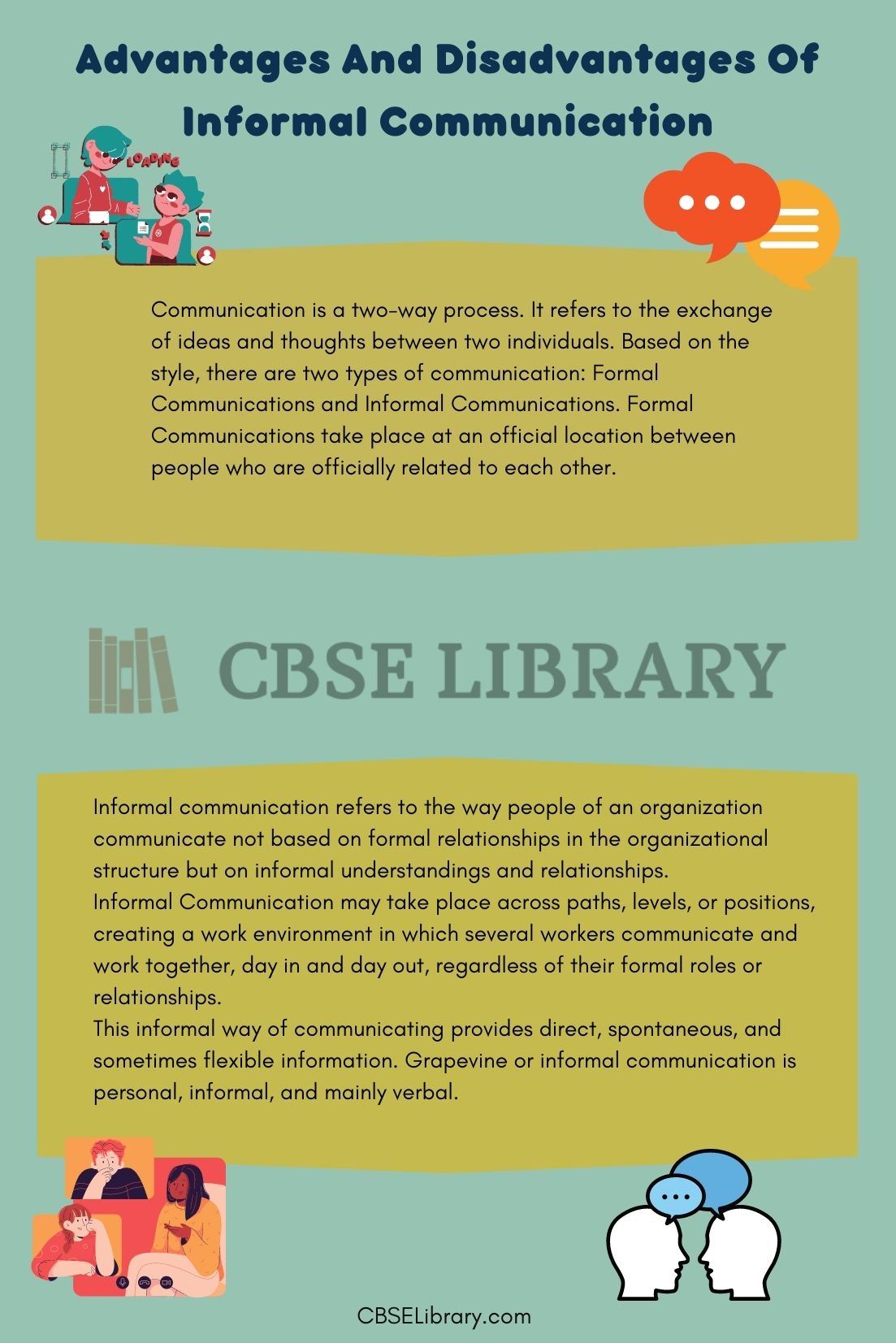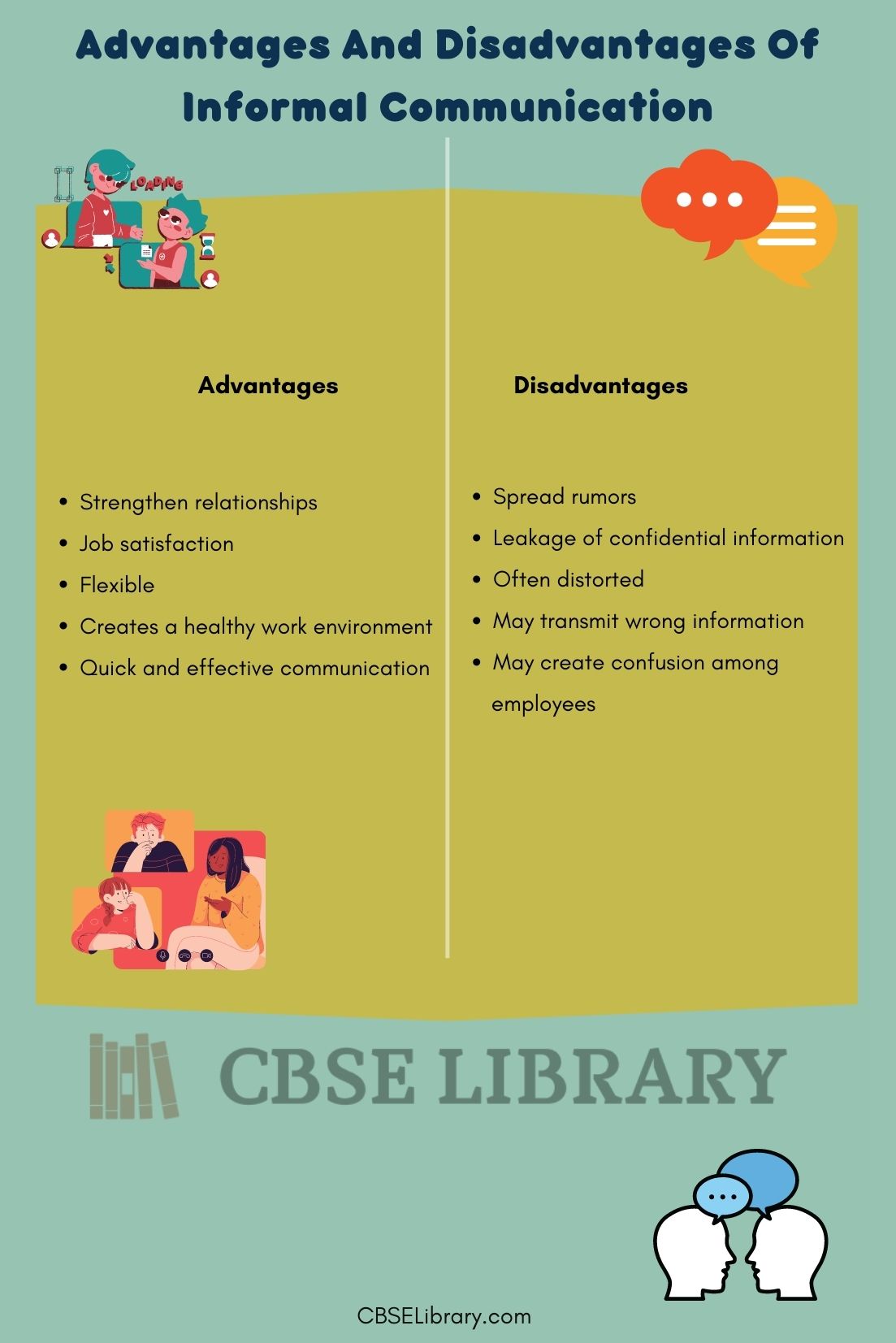Advantages And Disadvantages Of Informal Communication: Communication is a two-way process. It refers to the exchange of ideas and thoughts between two individuals. Based on the style, there are two types of communication: Formal Communications and Informal Communications. Formal Communications take place at an official location between people who are officially related to each other.
The unofficial and spontaneous flow of information between managers, employees, colleagues, and other people within an organization is known as informal communication, it consists of understandings and relationships and is often unstructured; it is also known as grapevine communication since it is verbal, personal, direct, and flexible.
Informal communication within an organization often extends over employee responsibilities due to its casual nature, and it is very prevalent in cases where employees of different levels work, gossip, and communicate with one another regardless of their formal relations, this type of understanding and communication is beneficial for employees and improves employee morale.
Students can also find more Advantages and Disadvantages articles on events, persons, sports, technology, and many more.
What is Informal Communication? Advantages and Disadvantages of Informal Communication
Informal communication refers to the way people of an organization communicate not based on formal relationships in the organizational structure but on informal understandings and relationships.
Informal Communication may take place across paths, levels, or positions, creating a work environment in which several workers communicate and work together, day in and day out, regardless of their formal roles or relationships.
This informal way of communicating provides direct, spontaneous, and sometimes flexible information. Grapevine or informal communication is personal, informal, and mainly verbal.
In informal communication, words and phrases are used differently than those used in formal communication, and it is usually done orally and with gestures; it can be used by members of an organization and among their social circle; it takes place between friends and family; it is not restricted in terms of using foul language; it is usually done orally and with gestures.
Informal communication is an intrinsic part of all organisational processes. The proper analysis and clarification of informal communication will enhance the effectiveness of the organisation.
In informal communication, authority lines do not exist. In an organization, it is useful in finding out employee grievances as people express themselves better when they are doing so informally. Informal communication also helps in building relationships.
- Advantages of Informal Communication
- Disadvantages of Informal communication
- Comparison Table for Advantages And Disadvantages Of Informal Communication
- FAQ’s on Advantages And Disadvantages Of Informal Communication
Advantages of Informal Communication
The Advantages of Informal Communication are as follows:-
Building Relationships: Through informal communication, any conflicts between labour and management can be resolved. Well-trained labour and management can establish balanced relationships that enable cooperation and coordination to be established. Such relationships are only possible through informal communication.
Increase Organisational Efficiency: Through informal communication, employees are able to freely exchange their opinions. They can ask any question without hesitation. Thus, a friendly atmosphere of openness and mutual understanding is created to increase employee performance.
Finding out staff Grievances: Through formal communication, employees cannot raise any complaints to superiors; however, informal communication gives employees the opportunity to raise complaints, grievances, or claims with ease. Sometimes, the grapevine has a significant impact as an informal communication system. Using informal communication, management can discover problems, conflicts, issues and complaints. Thus, management can take appropriate action quickly and effectively.
Measuring Reaction: It is essential that management first determine the reaction of employees to any new information before communicating it formally. Informal communication can prove useful in this scenario, as it can allow management to determine the reaction of employees before communicating any information formally.
Disadvantages of Informal communication
The Disadvantages of Informal Communication are as follows:-
Lack of secrecy: In informal communication as well, there is a leak of secrecy problem since the parties can freely cooperate because there are no rules. Since these communications do not follow rules, private information about the organization can easily leak out. Almost all undisclosed topics are likely to be released without any predicament or uncertainty, which has the potential to cause significant damage to a company.
Creating rumors: In informal communication, people fabricate the truth and make an elaborate picture by faking some evidence and mixing untrue material. Since there are no rules to informal communication, people try to use this channel to present the truth in different ways. This method creates a rumor or misinformation that spreads quickly; thus, the truth is transformed into a false rumor, which spreads quickly, transforming the original information into a false one.
Lack of discipline: The informal channel of communication is subject to errors and omissions since no official rule or parameter operates in this instance of communication. Informal channels of communication do not follow the established chain of command and are not subject to the rules of the organization. Consequently, indiscipline may be evident in all of the activities of the organization as a result of this unorganized communication.
Misrepresentation of the message:- The biggest disadvantage of informal communication is that it transmits inaccurate information since these networks don’t abide by any kind of rules or abide by any method. In informal communication, there are no set rules or formalities, so it can convey any kind of information to anybody with no admiration or fear attached. Therefore, people sometimes transmit distorted information through informal channels without inhibition or hesitation. Often, it spreads false or distorted news that might even seem harmful to employees themselves.
Creating misunderstanding:- Informal communication leads to misunderstandings due to a lack of ethics, confidence, decency, and rules. This leads to conflicts and misconceptions in an organisation. As a result of this, there may be disagreement between employees. Typically, under this system, employees do not adhere to the formal approval process since informal channels of communication transmit false, distorted and wrong information.

Comparison Table for Advantages And Disadvantages Of Informal Communication
| Advantages of Informal Communication | Disadvantages of Informal communication |
| Strengthen relationships | Spread rumors |
| Job satisfaction | Leakage of confidential information |
| Flexible | Often distorted |
| Creates a healthy work environment | May transmit wrong information |
| Quick and effective communication | May create confusion among employees |

FAQ’s on Advantages And Disadvantages Of Informal Communication
Question 1.
What is Informal Communication?
Answer:
Information that is freely exchanged between managers, employees, colleagues, and other individuals within an organization is referred to as informal communication, which is often unstructured and based on understandings and relationships; it is also known as grapevine communication as it is informal, personal, direct, and flexible.
Question 2.
What is Communication?
Answer:
Communication is a two-way process, where thoughts and ideas are exchanged between two individuals.
Question 3.
What are types of Communication?
Answer:
Based on the style, there are two types of communication: Formal Communications and Informal Communications. Based on the communication channel, there are also two types of communication: Verbal Communication and Non-Verbal Communication
Question 4.
What are the benefits of Informal Communication in an organization?
Answer:
Informal communication is conducted in a regulated environment. The regulated environment means that there is no pressure on offices large or small. Informal communication is much more flexible than formal communication because there are no formalities to meet. The responses of the employees can be easily recorded.
